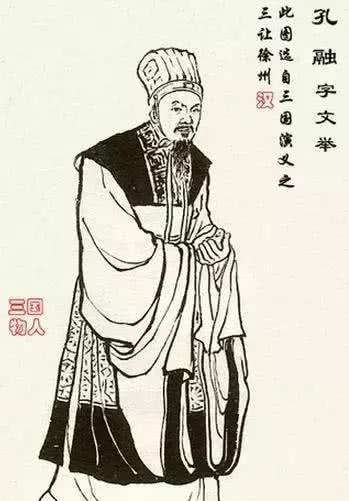The story of "Kong Rong Let pears" in the primary school textbook is well known, and what did Kong Rong, who was brilliant as a child, do after becoming a benchmark for filial piety? This world-famous seventh son of Jian'an was ultimately killed for the crime of filial piety by Cao Cao?

For thousands of years, Kong Rong in the book was the head of the seven sons of Jian'an, the official to Beihai Taishou, the twentieth grandson of Confucius, a world celebrity with outstanding literary talent, and a local leader at the time, who also had considerable political achievements, in fact, what kind of person was he?
This must begin with the prevalence of Confucianism in the Han Dynasty
Since Emperor Wu of the Han Dynasty established "filial piety" as a channel for promoting officials, filial piety and pro-chiefs, upright and virtuous people could be recommended by the villagers to become civil servants in the imperial court. The Han Dynasty made "filial piety" an important criterion of personality, so important that you can be incompetent, but you cannot be filial piety.
Born in this era, Kong Rong naturally received Confucian ethics education from a young age, and when he was four years old, when his father died at the age of thirteen, he almost cried half his life, and he had to be supported when he walked, which was jokingly called "filial piety", and then Kong Rong became the Xiangguo of the North Sea as he wished.
After taking office, he neither repaired the city nor trained the army and horses, but did one thing: to promote Confucianism and practice filial piety.
Ancient texts record that when Kong Rong was doing the Beihai Xiangguo, he found that a person who sacrificed his ancestors did not cry thoroughly, so this Xiangguo lord who had ascended to the throne by weeping immediately arrested this person to the official palace and killed him for the crime of filial piety.
Due to the long-term abandonment of military buildings in beihai, the army was scattered, the officers and soldiers were defeated by the Yellow Turban Army several times, when Guan Hai led tens of thousands of Yellow Turban troops to besiege the city, it was still Tai Shi Ci who stood alone and protruded from the siege to ask Liu Bei for help, and finally Liu Bei led 3,000 soldiers to beat Guan Hai away. After being besieged by Yuan Tan again, the city gate was broken and both sides began to fight in the street, only Kong Rong was still sitting in the house reading and talking and laughing with everyone, and as a result, at night he left his wife and children and ran away, and his wife and children were also captured by Yuan Tan.
As described in the "Book of Han" and "Book of Later Han", at that time, the Confucian forces were very large, up to the court, down to the countryside, everyone regarded themselves as Confucian children, moral gentlemen, praising each other, and it was also the most prevalent in this period, so Kong Rong indiscriminately killed the people, and it did not matter if the city was destroyed, and he was immediately recommended by other famous people to Cao Cao as an official, and even recommended by Liu Bei as a secretary, which is equivalent to the current governor of Shandong Province, and when he was a child, Kong Rong of Pear had no more "filial piety" deeds after he left shi. The history books describe more of his weak military abilities and his dull political sense of smell.
After changing to Cao Cao, he still indulged in his nature, often raised the bar with Cao Cao, and sneered at the boss, which eventually led to his death in Xuchang, because he was afraid of losing the sincerity of the Confucians in the world, and Cao Cao posted a notice pointing out his specific remarks on filial piety:
Kong Rong once said to a friend that what grace the father and the son have is only the lust at that time; what love the son and the mother have, like a thing temporarily stored there.
To say such a thing, and finally to sentence him to death for filial piety, is also a matter of course. A generation of great Confucian Kong Rong was killed by Cao Cao in this way.